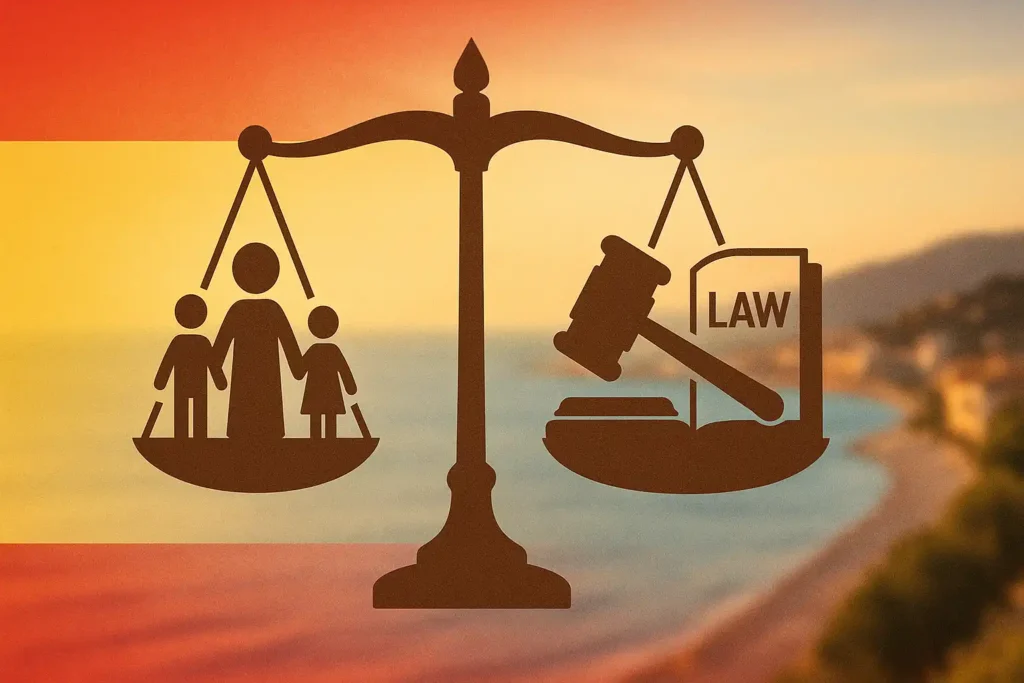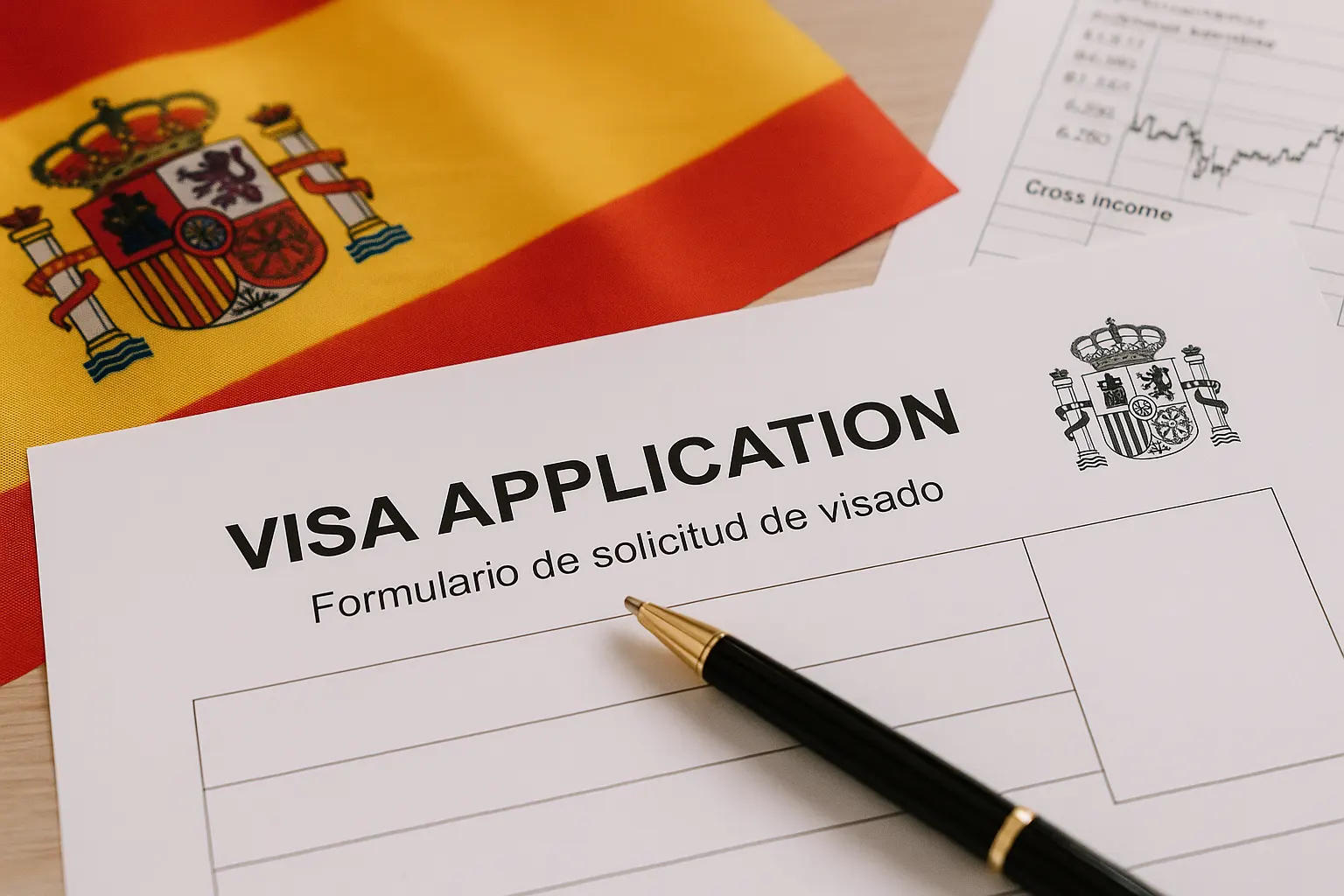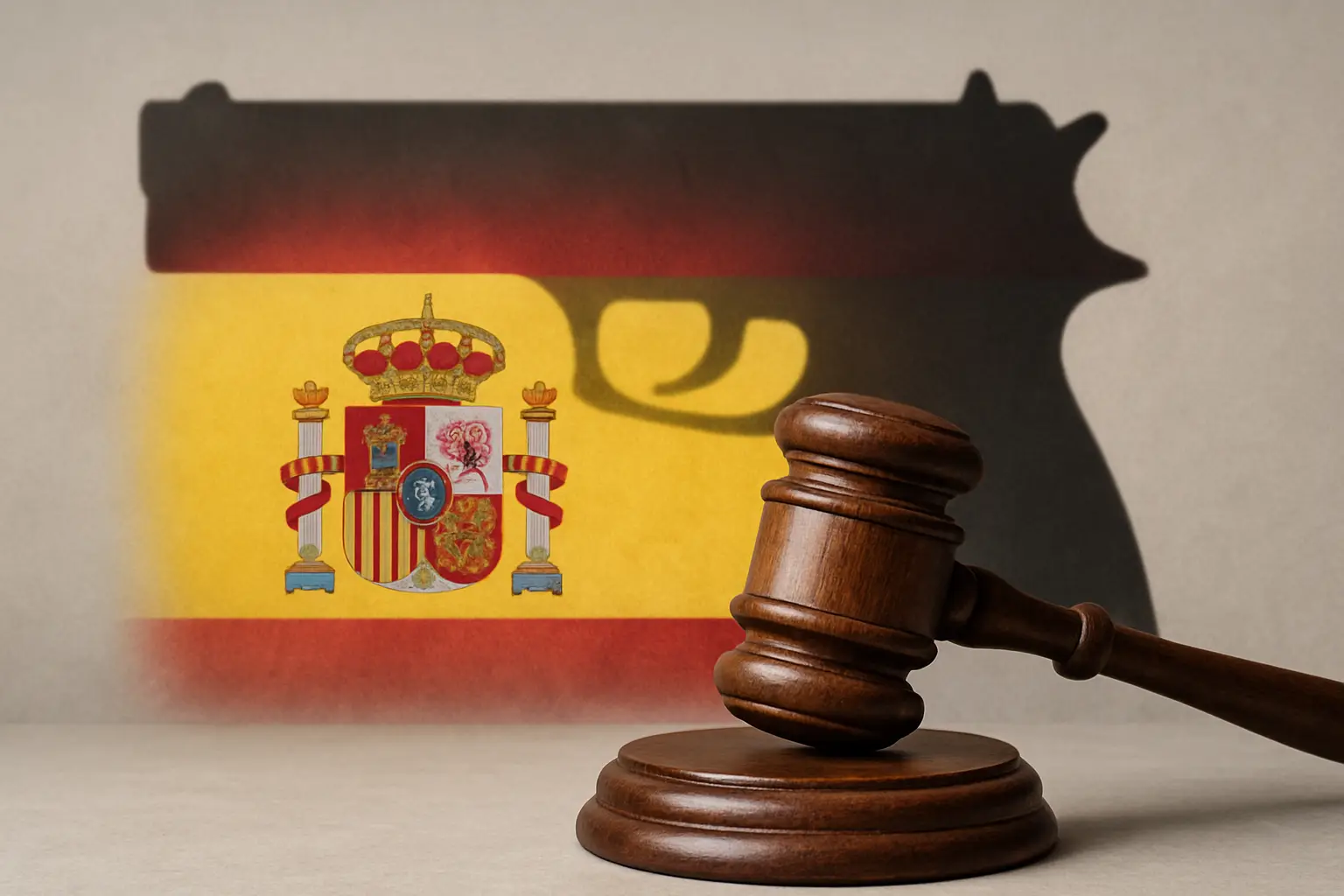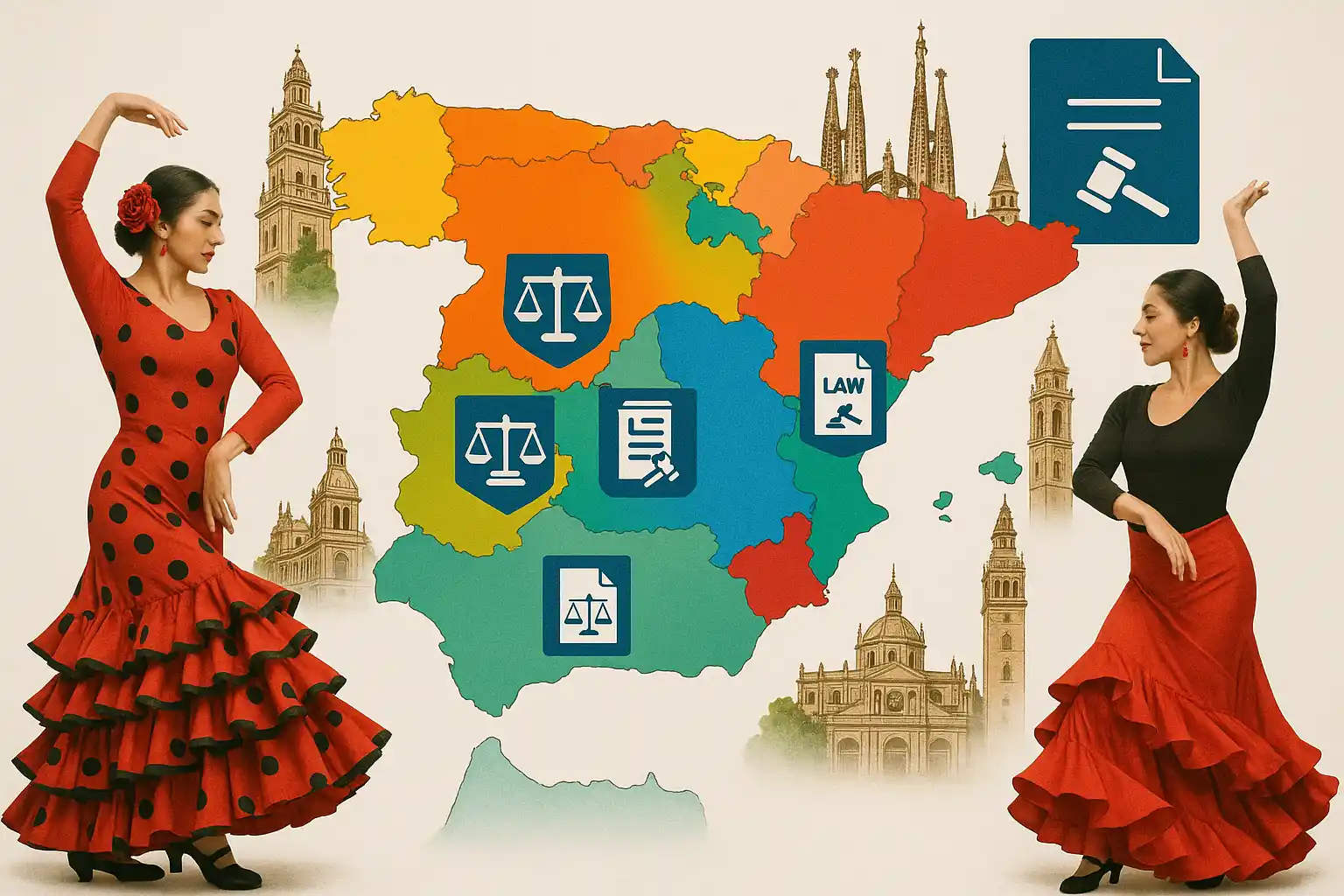Divorce in Spain for foreigners in 2026 involves navigating a legal framework that balances Spanish civil law with the specific circumstances of non-national spouses. Understanding Spanish divorce laws is essential for expats to ensure their rights and obligations are properly addressed during marriage dissolution.
Key points to consider:
-
Legal landscape: Divorce regulations in Spain apply uniformly but may have nuances depending on residency status and jurisdiction.
-
Residency requirements: Generally, at least one spouse must be a resident or have children residing in Spain to file for divorce under Spanish courts. This is where understanding the Spain Digital Nomad Visa for family members can be beneficial, as it allows remote work while providing access to top healthcare and quality education for children.
-
Jurisdictional distinctions: Courts in Spain hold authority over divorces involving residents; expats living abroad might face different procedural paths.
-
Differences for foreigners: Divorce laws accommodate both residents and non-residents, but procedural aspects and eligibility criteria can vary significantly.
Navigating these factors requires clear knowledge of the Spanish legal system and applicable residency rules. Foreign spouses should also be aware of how local regulations interact with their home country’s laws, especially when property division, child custody, or immigration implications arise. For instance, if you are considering a Spain spouse visa during this process, understanding the requirements and process can aid in a smoother transition.
Contact NIM Immigration Lawyers for personalized legal advice tailored to your divorce proceedings in Spain.
Understanding the Legal Framework Governing Divorce in Spain
Divorce procedures in Spain are primarily governed by the Civil Code, which outlines the legal framework for ending a marriage, including divorce and legal separation. The civil code establishes clear distinctions between these two processes:
1. Legal Separation in Spain
Legal separation allows spouses to live apart without terminating the marriage. It addresses issues like child custody, support, and property arrangements but does not permit remarriage.
2. Divorce
Divorce officially ends the marital bond, freeing both parties to remarry. It involves decisions on asset division, custody, and support.
The matrimonial regime agreed upon at marriage or during the union plays a critical role in how assets are divided upon divorce. Common regimes include community property and separation of assets, each affecting financial outcomes differently.
Filing a divorce petition requires proper jurisdiction. Typically, this means submitting the petition to the court where either spouse resides or where minor children live. Both spouses or just one can initiate the process depending on whether the divorce is by mutual consent or contested.
Questions often arise: Is divorce legal in Spain? Yes, since 1981 Spain has allowed no-fault divorces without requiring proof of wrongdoing. This modernization simplifies procedures for foreigners navigating Spanish courts.
Residency and Eligibility Requirements for Divorce in Spain
Foreigners seeking divorce in Spain must meet specific residence or family connection criteria to establish jurisdiction. Key eligibility requirements include:
-
Residency of at least six months: One or both spouses must have been legally residing in Spain for a minimum of six continuous months prior to filing.
-
Presence of children: If the couple has children habitually residing in Spain, this can also confer jurisdiction regardless of the parents’ residency status. In such cases, it’s worth exploring family-friendly options in Spain which can make the transition smoother for both parents and children.
The legal framework permits filing for divorce when these conditions are satisfied, enabling access to Spanish courts. This approach accommodates the diverse circumstances of expats while maintaining procedural clarity.
Engaging a divorce lawyer in Spain is advisable to navigate these requirements effectively. Lawyers specializing in divorce for expats in Spain understand nuances such as jurisdictional challenges and residency proofs, which are critical for a valid petition.
Recent divorce in Spain statistics indicate that many foreigners successfully initiate proceedings under these provisions, reflecting the system’s adaptability to international family dynamics.
Types of Divorce Proceedings in Spain: Uncontested vs. Contested Divorces
Divorce in Spain can proceed through two primary types of legal processes, distinguished by the level of agreement between spouses: uncontested divorces and contested divorces.
Uncontested Divorces (Mutual Consent)
An uncontested divorce, also known as a mutual consent divorce, occurs when both parties agree on all aspects of the divorce. This includes decisions regarding asset division, child custody, and support arrangements. Here are some key points about uncontested divorces:
-
The procedure is streamlined and generally faster, often referred to as an express divorce.
-
Filing a joint petition reduces court involvement and expedites resolution.
-
Typical timeline ranges from a few weeks to a couple of months, depending on court workload.
-
Requires submission of a comprehensive agreement outlining all terms.
-
Courts primarily verify that agreements comply with legal standards and protect children’s interests.
Contested Divorces
A contested divorce occurs when spouses cannot reach consensus on one or more issues. In such cases, individual petitions are filed, and multiple court hearings may be required. Here are some important aspects of contested divorces:
-
Courts evaluate evidence, hear testimonies, and make binding decisions regarding disputed matters.
-
Lengthy process that can extend over several months or even years.
-
Higher legal costs due to complexity and increased lawyer involvement.
-
Decisions may cover property division, custody arrangements, visitation rights, and financial support.
Express divorces reflect the Spanish legal system’s emphasis on facilitating amicable resolutions where possible. Conversely, contested cases highlight judicial intervention when mutual consent is absent. Understanding these distinctions is critical for foreigners navigating divorce in Spain to select the most appropriate path based on their circumstances.
Property Regimes and Financial Aspects in Spanish Divorces: What You Need to Know as an Expat
Understanding the property regime chosen during marriage is essential for expats undergoing divorce in Spain. Spanish law recognizes three primary property regimes that dictate how matrimonial property assets are managed and divided:
1. Community Property (Sociedad de Gananciales)
This regime presumes that assets acquired during the marriage, except for inheritances or gifts, belong jointly to both spouses. Upon divorce, these shared assets are divided equally unless otherwise agreed.
2. Separation of Assets (Separación de Bienes)
Each spouse retains ownership and control over their individual assets acquired before and during the marriage. There is no automatic sharing of matrimonial property assets; division occurs only for jointly owned property.
3. Participation Regime
A hybrid system where spouses keep separate ownership during marriage but share in the gains or profits accrued by each other’s assets upon dissolution.
The choice of regime impacts how assets such as real estate, bank accounts, investments, and debts are allocated when filing for divorce. If no agreement exists, community property rules generally apply by default in many regions. Couples can establish a different regime through a prenuptial agreement or later modification, which affects asset division outcomes.
Knowledge of these distinctions assists expats in anticipating financial consequences, negotiating settlements, and protecting their interests under Spanish law.
Child Custody and Support Arrangements Under Spanish Law: A Guide for Foreigners Navigating Divorce Proceedings in Spain
Spanish family law prioritizes the best interests of the child when determining custody and support. The legal framework promotes equal parental rights, recognizing both parents’ responsibilities in childcare and upbringing after divorce or separation.
Custody Types
-
Joint Custody (Guarda conjunta)
-
Increasingly common, joint custody allows both parents to share parental responsibilities. Courts favor arrangements where cooperation between parents is feasible, ensuring the child’s stability and access to both parents.
-
Sole Custody (Guarda exclusiva)
-
Granted when one parent is deemed unfit or unable to care for the child adequately. The non-custodial parent usually receives visitation rights unless restricted by court orders.
Factors Courts Consider
When deciding custody, Spanish courts evaluate:
-
The child’s age and preferences if sufficiently mature
-
Parents’ ability to provide care and maintain a stable environment
-
Existing emotional bonds between child and each parent
-
History of parental involvement and any evidence of abuse or neglect
-
Geographic proximity allowing meaningful contact with both parents
Child Support and Maintenance
Both parents bear financial responsibility for their children. Courts establish maintenance payments based on:
-
Parents’ income levels
-
Child’s needs, including education, health, and general welfare
-
Custody arrangement specifics
Child support continues until the child reaches adulthood or completes higher education under certain circumstances.
Understanding parental responsibilities and legal custody distinctions aids foreign nationals navigating divorce in Spain, ensuring informed decisions aligned with family law requirements.
Cost Implications of Divorce Proceedings in Spain for Expats
Understanding the cost of divorce is essential for expats considering divorce. The cost of divorce in Spain varies significantly depending on whether the case is uncontested or contested.
1. Uncontested Divorces
These involve mutual consent and typically incur lower expenses. Lawyer fees may range from €600 to €1,500, while court fees are minimal or sometimes waived due to the streamlined process.
2. Contested Divorces
When disagreements arise over custody, property, or financial support, legal costs increase substantially. Lawyer fees can exceed €3,000, and additional court costs may apply due to longer proceedings.
Other factors influencing expenses include:
-
Complexity of asset division
-
Number of hearings required
-
Need for expert reports or mediation
Financial planning should anticipate these variables to manage the divorce’s economic impact effectively. The question How much does divorce cost in Spain? depends largely on cooperation levels between spouses and procedural complexity.
Moreover, it’s crucial to consider the overall cost of living in Spain, which can add another layer of financial strain during such a challenging time.
Common Reasons for Divorce in Spain: Understanding the Legal Basis for Marital Dissolution as an Expat
Spanish law has a liberal approach to divorce, focusing on marital breakdown as the main reason for ending a marriage instead of blaming one party. The legal system allows couples to file for divorce without having to prove fault or specific reasons.
Key points regarding reasons for divorce in Spain include:
-
No-fault divorce: Since the 2005 reform of the Spanish Civil Code, spouses can request divorce based solely on the irretrievable breakdown of the marriage. There is no requirement to demonstrate misconduct such as adultery or abandonment.
-
Separation period: Unlike some jurisdictions that mandate a minimum separation period before filing, Spain permits immediate requests for divorce once married, although a short period of three months from marriage is generally expected unless exceptional circumstances exist.
-
Grounds for annulment: Annulment differs from divorce and applies in cases where a marriage is declared null due to reasons such as lack of consent, bigamy, or incapacity at the time of marriage. These are more limited and complex grounds compared to straightforward divorce.
-
Mutual consent: Commonly cited among expats are mutual consent divorces, where both parties agree on termination and related matters, expediting proceedings.
-
Contested divorces: When disagreement exists regarding grounds or terms, courts assess evidence relating to marital breakdown but do not require establishing fault.
The emphasis on marital breakdown instead of fault reduces adversarial conflicts and simplifies access to divorce for foreigners navigating Spanish law.
Quickest Ways to Obtain a Divorce in Spain
The quickest way to get divorce in Spain is through the express divorce procedure, applicable exclusively to uncontested cases. This route requires both spouses to agree on all key issues, including:
-
Division of assets and debts
-
Child custody and visitation rights
-
Spousal support arrangements
When mutual consent exists, couples can submit a joint petition to the court, significantly reducing processing times compared to contested divorces. The absence of disputes eliminates the need for lengthy hearings, allowing judges to issue a decree promptly.
Key conditions enabling this fast-track procedure include:
-
Both parties must be legally capable and willing to proceed without conflict.
-
There should be no pending criminal or civil proceedings between the spouses.
-
Residency requirements are met by at least one spouse.
Uncontested divorces completed via this method often conclude within a few months, making it the preferred approach for those seeking an efficient dissolution of marriage under Spanish law.
Rights and Entitlements After Divorce in Spain: What Every Expat Should Know About Post-Dissolution Financial Matters, Child Custody Arrangements, And Immigration Consequences
Understanding wife entitlements Spain divorce and spouse rights post-divorce Spain is essential for foreigners navigating dissolution proceedings. Spanish law provides clear frameworks governing property division, maintenance payments, child custody, and immigration effects after divorce.
Property Division and Maintenance Payments
Spanish divorce law generally divides assets according to the matrimonial property regime chosen during marriage:
-
Community Property (Sociedad de Gananciales): Assets acquired during the marriage are usually split equally between spouses.
-
Separation of Assets (Separación de Bienes): Each spouse retains individual ownership of assets acquired separately.
-
Participation Regime: Combines features of the first two, with specific rights to participate in gains.
The spouse may be entitled to financial support post-divorce through alimony or maintenance payments, depending on:
-
Economic needs of the spouse requesting support.
-
The financial capacity of the other spouse.
-
Duration of the marriage.
-
Custodial responsibilities toward children.
Questions such as what is a wife entitled to in a divorce in Spain? often revolve around these aspects. Courts may order maintenance payments for spouses who cannot support themselves adequately after divorce.
Immigration Status Impact
Divorce can affect foreign spouses’ residency rights in Spain. Key points include:
-
If residency was dependent on marriage (family reunification or spousal visa), divorce may trigger review or cancellation of residence permits.
-
Foreigners must notify immigration authorities promptly about changes in marital status.
-
It is advisable to seek legal counsel to explore options for independent residency permits post-divorce based on employment, self-employment, or long-term residence criteria.
Legal advice tailored to individual circumstances ensures protection of both civil and immigration rights following divorce.
Statistical Insights on Divorce Trends Among Foreigners in Spain
Understanding divorce statistics in Spain reveals significant patterns among foreign nationals navigating family law trends. Data from recent years indicate that expat couples account for a notable percentage of marital dissolutions, reflecting the complexities faced by multicultural unions within Spanish jurisdiction.
Key points regarding divorce among foreigners include:
-
Prevalence Rates: Foreign spouses constitute approximately 15-20% of total divorces filed annually in Spain, underscoring their considerable representation in family law cases.
-
Demographic Variations: Higher divorce rates appear among couples where one partner is non-European, often linked to challenges adapting to differing legal and cultural frameworks.
-
Regional Differences: Autonomous communities with larger expat populations, such as Catalonia and the Valencian Community, report increased filings of divorce petitions involving foreigners.
-
Type of Proceedings: Mutual consent divorces dominate among expats due to the preference for amicable resolutions amid cross-border legal considerations.
These figures highlight the importance of tailored legal guidance for foreigners seeking divorce in Spain. Understanding prevailing trends aids in anticipating procedural hurdles and optimizing outcomes under Spanish family law.
Contact us today for expert advice on navigating your divorce process in Spain.
Practical Steps to Apply for Divorce as a Foreigner Living in Spain
Understanding how to apply for divorce in Spain as a foreigner requires familiarity with the local filing procedure and legal requirements. The process involves several clear stages, starting with professional guidance and culminating in the official divorce decree.
Step 1: Initial Consultation with a Lawyer
Foreigners should seek advice from an experienced Spanish family law attorney. Legal experts clarify eligibility criteria, assess personal circumstances, and determine the best procedural approach—whether uncontested or contested divorce.
Step 2: Gathering Documentation
Essential documents typically include:
-
Marriage certificate (officially translated and apostilled if issued abroad)
-
Identification documents (passport, NIE or TIE card)
-
Proof of residency or children residing in Spain
-
Property and financial records relevant to asset division
Step 3: Filing the Divorce Petition
The petition must be submitted to the competent Spanish court. Jurisdiction generally depends on either spouse’s residency or the location of minor children. The lawyer files the petition on behalf of the client, ensuring compliance with procedural rules.
Step 4: Serving Notification to the Spouse
If it is an uncontested divorce, both parties sign a joint petition. In contested cases, formal notification is served to the non-filing spouse who has the right to respond within a legally defined period.
Step 5: Court Proceedings and Hearings
For mutual consent divorces, courts often approve without hearings, expediting the process. Disputed cases require hearings where evidence and arguments are presented before a judge renders decisions on custody, property, and maintenance.
Step 6: Issuance of Divorce Decree (Sentencia de Divorcio)
Once proceedings conclude successfully, the court issues a final decree dissolving the marriage. This document is essential for updating civil records and initiating post-divorce legal processes such as property registration or changes in immigration status.
Legal advice remains critical throughout these steps due to complex jurisdictional rules and possible regional variations within Spain’s autonomous communities.
Challenges Faced by Foreigners During Divorce Proceedings in Spain
Foreigners initiating a divorce in Spain often encounter multiple challenges that complicate the process. Understanding these difficulties is essential for effective navigation through the Spanish legal system.
Language Barriers
One of the most immediate obstacles is the language difference. Legal documents, court proceedings, and official communications are predominantly conducted in Spanish. Without proficient language skills or reliable translation services, misunderstandings can arise, potentially delaying the case or resulting in unfavorable decisions. Access to bilingual legal counsel familiar with both Spanish law and foreign legal terminology becomes critical.
Differences Between Home Country Laws and Spanish Regulations
Foreign nationals must reconcile their home country’s divorce laws with those of Spain. This challenge emerges primarily when spouses have different nationalities or previous marriages governed by diverse legal frameworks. For example:
-
Property division rules may vary significantly.
-
Grounds and procedures for divorce could differ.
-
Custody arrangements might follow contrasting principles.
These discrepancies require careful legal analysis to determine which jurisdiction applies and how conflicts of law are resolved under Spanish regulations.
Regional Variations Within Autonomous Communities
Spain’s autonomous communities possess some legislative autonomy affecting family law aspects such as property regimes or procedural rules. For instance:
-
Catalonia has its own civil code influencing marital property.
-
Basque Country and Navarre maintain specific matrimonial property systems.
-
Procedural timelines and court practices may vary regionally.
Foreigners divorcing in Spain must identify regional particularities to ensure compliance with local regulations while filing petitions and negotiating settlements.
Challenges foreigners divorcing Spain legal system face extend beyond paperwork; they involve cultural nuances and the complexity of harmonizing multiple legal traditions.
Post-Divorce Considerations Including Remarriage And Immigration Status For Expats In Spain
Divorce in Spain brings significant legal and personal changes, especially for foreigners. Understanding the implications of remarriage after divorce Spain legal effects immigration status is essential for expats.
Key points to consider:
1. Remarriage Legal Effects
Remarrying after divorce is legally permitted once the divorce decree is finalized. The new marriage must be registered in Spain, affecting marital property regimes and inheritance rights.
2. Immigration Status Impact
Divorce can influence residency permits linked to marriage, such as family reunification visas. Expats should verify their immigration status post-divorce to ensure continued legal residence.
3. Renewal and Application of Permits
Non-EU nationals may need to apply for independent residence permits if they previously relied on a spouse’s status. Early consultation with immigration lawyers helps prevent lapses.
4. Child Custody and Support Obligations Continue
Divorce does not affect parental responsibilities. Compliance with court orders on custody and support remains mandatory.
Expats navigating post-divorce life in Spain benefit from professional legal advice tailored to both family law and immigration regulations. This ensures smooth transitions regarding remarriage and residency rights.














